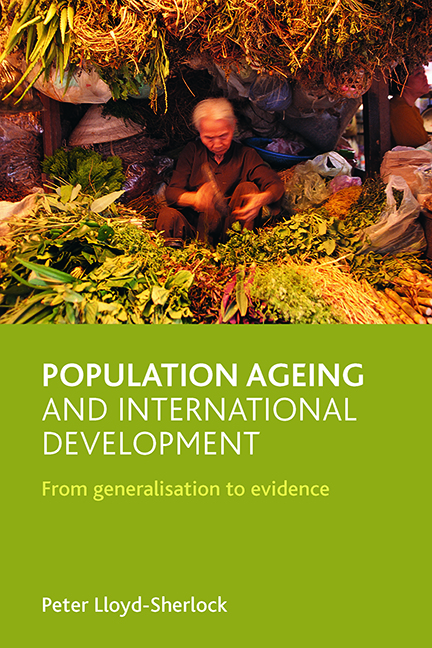Book contents
- Frontmatter
- Contents
- List of abbreviations
- Acknowledgements
- Notes on the author
- Introduction
- one International development and population ageing
- two Experiencing later life in contexts of development
- three Older people, pensions and development
- four Population ageing and health
- five Later life and social relations: family, migration and care
- six Ageing and development in South Africa
- seven Ageing and development in Argentina
- eight Ageing and development in India
- nine Conclusions and overview
- References
three - Older people, pensions and development
Published online by Cambridge University Press: 15 July 2022
- Frontmatter
- Contents
- List of abbreviations
- Acknowledgements
- Notes on the author
- Introduction
- one International development and population ageing
- two Experiencing later life in contexts of development
- three Older people, pensions and development
- four Population ageing and health
- five Later life and social relations: family, migration and care
- six Ageing and development in South Africa
- seven Ageing and development in Argentina
- eight Ageing and development in India
- nine Conclusions and overview
- References
Summary
Introduction
Judging by the outputs of academics, policy makers and NGOs, pensions are by far the most important issue affecting the lives of older people in the developing world. For example, between 1984 and 2004, the World Bank issued over 200 loans and 350 papers on pension policy, but provided no loans or papers for other projects explicitly concerned with older people (Bretton Woods Project, 2006). This focus on pensions has dwarfed the amount of attention paid to issues such as health policy or the care economy. Much of the discussion about pension schemes is complex, full of jargon and deeply theoretical, making it challenging for readers who lack specialised technical knowledge of pension economics. This chapter provides a simplified analysis of two key issues, and it should be easily understood by non-economists. These two issues link into two widespread assumptions about pensions, development and older people. The first is that pension schemes have a large and obvious impact on the wellbeing of older people. The second is that one of the main ways in which population ageing affects development is through the associated costs of pension provision.
At first sight, it would seem obvious that there is a direct and simple link between pension benefits and the wellbeing of older people. In developed countries this is broadly true, since the great majority of older people receive pensions. As such, variations in the value of benefits and how they are calculated can have a large impact on older people's lives and are a high-profile political issue. Even so, pensions represent just one form of income and support for older people, and it is important to see the bigger picture. Also, becoming a pensioner is often linked with compulsory retirement from paid employment, and this may potentially limit older people's incomes, as well as their social networks.
In many developing countries, the link between pension policy and older people's wellbeing is much less direct. First, the majority of older people in developing countries do not receive a pension. For example, in Cameroon, which is quite typical of low-income countries, only around 10% of older people, mainly retired soldiers and civil servants, receive pensions (Fonchingong Che, 2008).
- Type
- Chapter
- Information
- Population Ageing and International DevelopmentFrom Generalisation to Evidence, pp. 61 - 90Publisher: Bristol University PressPrint publication year: 2010



